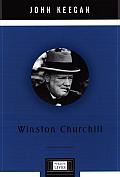 by John Keegan
by John Keegan
Churchill is in fashion again. His wartime leadership made him one of the character studies in Supreme Command. He’s been used as a model of executive leadership. He and Reagan have been the subjects of a joint study. The one limitation of all these studies is that they focus on his wartime leadership, often giving little background to his earlier political career. That’s fine for most Americans – most of us probably conceive of Churchill as having emerged from the womb arguing for an increase in the air defence budget.
In fact, Churchill is a far more complex political character than we usually think of. He had ambitions back to early adulthood, and fueled by his spendthrift sop of a father’s own failed bid for greatness. As Americans, who know about “never surrender” and Iron Curtains, and all that, it’s easy to forget that before the Wilderness Years would have been neither Wilderness nor Years if he weren’t already a major public figure. By the 30s, the British public already had an image of Churchill in their minds, shaped by his earlier career.
To get a feel for how Churchill’s early public life shaped his later public life, you can either wade through Manchester’s readable books, or you can pick up John Keegan’s sketch, Wintston Churchill, as part of the Penguin Lives series. Keegan covers all the major episodes – the River War, the Dardanelles, his pacing back and forth across the Parliamentary floor, and of course, his wartime Premiership. But there’s much more to the man – even the public man – both before and, as importantly, after the war.
At first blush, Keegan might seem an odd choice for the job. He’s known primarily for his military histories, and as mentioned, this biography has a wider scope than that. But Keegan has always understood war as a political venture more than a purely military one. In that sense, Churchill’s earlier career really was preparation for his wartime and post-war leadership.
Churchill chose an odd route to public life – a military career that served mostly as a means to a journalistic one. Like the best bloggers, he could write about the Boer War and the River War because he had been there, been shot at (without result), and had the training to know what he was looking at. Michael Yon, eat your heart out. Unlike bloggers, though, the only outlet of the day was the newspaper, and he needed his mother’s considerable influence to get published at first.
From there, it was on to a political career with the Tories, mostly because that’s where his father had been. But Winston, like his father, was to champion a liberal version of “Tory Democracy” that his party wasn’t ready for, and that was better-suited to the rival Liberals. Eventually, he abandoned the Conservatives altogether, joining the Liberals in order to push greater social services and an early version of welfare and the National Health. In fact, if World War II hadn’t happened, it’s likely he’d be mostly remembered for those innovations.
His military career – resumed in earnest during World War I – also probably soured him for good on the brass. His famous description of the Great War troops, “lions led by donkeys,” probably reflected his later determination as Prime Minister to defend the average soldier against the predations of the Generals.
Churchill’s return to the Tories has also been criticized, mostly unfairly, as opportunism. By the time he crossed back, basically unwanted, Labour was in ascendancy. With the Liberals as out of intellectual steam then as they are today, the Tories really were the only party capable of opposing the radical socialism on the Labour agenda. The fact that the Conservatives failed to make the case for a capitlist program to oppose Labour’s social program may not have been primarily Churchill’s fault – he was busy fighting a war, after all. But it certainly was the party’s greatest failing, and a lesson that today’s Republicans could learn from.
Keegan’s writing is typically crisp, he keeps the story moving without glossing over events, and keeps our interest. If you’re looking for a solid, thumbnail biography that puts blood, sweat, toil, and tears into context, this is the one.